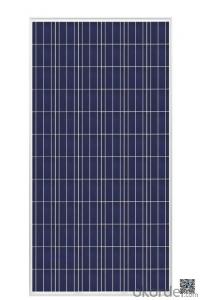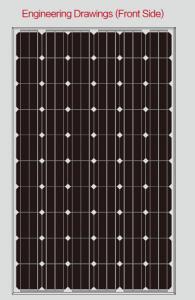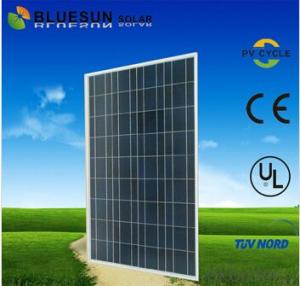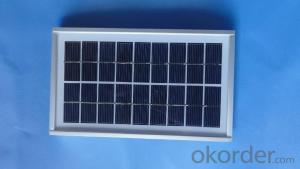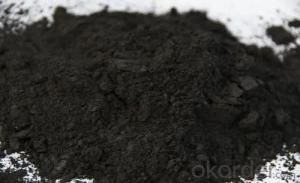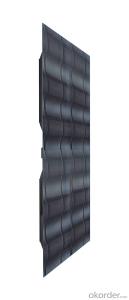SOLAR PANELS,SOLAR PANEL MONO IN CHINA ,SOLAR MODULE PANEL
- Loading Port:
- Shanghai
- Payment Terms:
- TT OR LC
- Min Order Qty:
- 2600 watt
- Supply Capability:
- 26000 watt/month
OKorder Service Pledge
OKorder Financial Service
You Might Also Like
Item specifice
We now provide
• Monocrystalline Solar Panel
• Polycrystalline Solar Panel( multicrystalline silicon Solar Panel)
Features of our products:
• High conversion efficiency mono/poly-crystalline amorphous silicon solar cells
• Modules incorporate high performance bypass diodes to minimize the power drop caused by shading
• High transmittance, low-iron tempered glass
• High performance EVA encapsulant to prevent destroying and water.
• AI frame: without screw, corner connection. 8 holes on the frame can be installed easily
• Good performance of preventing from atrocious weather such as wind and hails
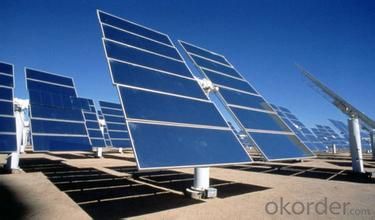
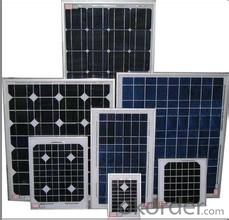
Polycrystalline Silicon Solar Modules 48Cell-195W Specification
ELECTRICAL PERFORMANCE | |||
Power output | P max | W | 195 |
Power output tolerances | ΔP max | W | 0/+5 |
Module effi ciency | η m | % | 14.7 |
Voltage at Pmax | V mpp | V | 23.7 |
Current at Pmax | I mpp | A | 8.03 |
Open-circuit voltage | V oc | V | 30.1 |
Short-circuit current | I sc | A | 8.65 |
Product Description:
This installation Manual contains essential information for the electrical and mechanical installation that your must know before installing CUSTOMER PV modules. This also contains safety information you need to be familiar with .All the information described in this manual are the intellectual property of CNBM and based on the technologies and experiences that have been acquired and accumulated in the long history of CUSTOMER. This document does not constitute a warranty, expressed or implied.
CUSTOMER does not assume responsibility and expressly disclaims liability for loss, damage, or expense arising out of in anyway connected with installation, operation, use or maintenance of the PV modules. No responsibility is assumed by CUSTOMER for any infringement of patents or other rights of third parties that may result from use of PV module.
CUSTOMER reserves the right to make changes to the product, specifications or installation manual without prior notice.
Solar panel working process
In addition to being the ultimate source of all life on earth, the sun is an infinitely renewable, completely pollution-free source of electricity. Instead of burning fossil fuels dug up from the ground in a big power plant – a very 19th century, industrial age approach, when you think about it – solar panels convert sunlight directly into electricity, with no harmful emissions.
The basic unit of a solar panel is a solar cell, which usually consists of one or two layers of silicon-based semiconductor wafers. When struck by the photons in sunlight, the solar cell generates an electrical charge due to the "photovoltaic effect" – which is a pretty good name, since it produces voltage from photons. The flow of these electrons moves in a steady electrical current from one side of the cell to the other.
Dozens of these PV cells are packaged together into solar modules, which in turn are packaged into solar panels that are mounted on a rooftop and arranged to maximize their hours of exposure to direct sunlight. Because the electricity generated by all those solar cells is direct current (DC), it is then sent to an inverter that transforms the power into the same alternating current (AC) used by the appliances in your home and the local utility electricity distribution grid. Increasingly, these inverters are getting "smart," providing data monitoring for solar installation performance and other grid integration services.
FAQ
We have organized several common questions for our clients,may help you sincerely:
Yes, we can, we have two companies for solar region, one is CNBM International, the other is CNBM engineering Co.
We can provide you not only the solar module but also the off grid solar system, we can also provide you service with on grid plant.
④What is your warranty system?
Our product performance guarantees for 25 years
• 12 years guarantee for workmanship
• Timeliness of delivery
• Quality Products certified (TÜV, UL, CE, ISO)
⑤How do you pack your products?
We have rich experience on how to pack the panels to make sure the safety on shipment when it arrives at the destination.
- Q:Can solar panels be used in areas with high pollution levels?
- Yes, solar panels can be used in areas with high pollution levels. While pollution may slightly reduce the efficiency of solar panels by blocking some sunlight, they can still generate electricity. In fact, using solar panels in such areas can be beneficial as they provide a clean and renewable energy source, helping to reduce reliance on polluting fossil fuels.
- Q:Say if i had a 2KW system is thtat just one big solar panel or does the whole system have little solarpanels together.?
- Solar panels are arrays of individual solar cells connected in series and parallel, and.. A high quality, monocrystalline silicon solar cell, at 25 °C cell temperature, may produce 0.60 volts open-circuit (Voc). The cell temperature in full sunlight, even with 25 °C air temperature, will probably be close to 45 °C, reducing the open-circuit voltage to 0.55 volts per cell. The voltage drops modestly, with this type of cell, until the short-circuit current is approached (Isc).
- Q:Can solar panels be used in areas with high levels of noise pollution?
- Yes, solar panels can be used in areas with high levels of noise pollution. Noise pollution does not affect the functionality or performance of solar panels.
- Q:I want to know that, is there any thing likehow much charge we can get per square feet. in a solar panel.let me know.also, I will appreciate if reference are given.
- Solar okorder
- Q:I am starting to think about solar panels as an option for my home. I have done some research on panels, to be honest its all very confusing. There are many different panels some with 60 watts some all the way up to 20 watts. My household currently uses about 2700 to 3400 kWh every two months. So based off of my power usage maybe you can answer some of the following questions:What kind of panels should I be looking at?Which panel manufacturers give the best bang for the buck (reliable/affordable)?Anything else I should be concerned about?I am just starting out in educating myself on solar power so please excuse me if I sound very naive. Any information that you may have will be helpful. Thanks in advance.
- solar cell is a solar cell solar panel are many solar cells.... Typically people refer to a single solar panel as a solar panel, even though they should be reffering to it as a solar cell. A solar panel is a panel of solar cells working in conjunction with each other. I hope that makes sense it is just the incorrect terminology people always use.
- Q:in the afternoon sun heat increases to high level due to which the panels heats up very high now my question is this heat will effect the panels life time and will damage the panels or not ??
- Some are better than others. It depends on the manufacturing technique. All will degrade over time, some over decades, others over months (if they're defective).
- Q:Can solar panels be used in areas with frequent thunderstorms?
- Yes, solar panels can be used in areas with frequent thunderstorms. While thunderstorms may temporarily reduce the efficiency of solar panels due to cloud cover and reduced sunlight, they do not pose any significant risk to the panels themselves. Properly installed solar panels are designed to withstand various weather conditions, including thunderstorms. Additionally, the energy produced by solar panels during sunny periods can still offset the electricity consumed during stormy periods, making them a viable option for areas prone to thunderstorms.
- Q:Do solar panels require maintenance?
- Yes, solar panels do require maintenance. Regular cleaning to remove dirt, dust, and debris is necessary to ensure optimal efficiency. Additionally, periodic inspections and maintenance checks are recommended to identify and address any potential issues such as loose connections, wiring problems, or shading that may affect performance. However, compared to other forms of energy generation, solar panels require relatively low maintenance efforts.
- Q:I have a solar panel i got for free and I don't know what to do with it. Its kinda big at about 20x 0and it puts our 2 VOC / .23 ISC. I don't know of anything that I could use it for. Its too big to say charge a phone or ipod....any suggestions??
- 2 volts rate at .23 ampere. It can be used to charge car battery. Put a 5 ohms rated 0 watts resistor in series between panel and 2.6 volts car battery to lower its voltage.
- Q:What is the typical warranty period for solar panels?
- The typical warranty period for solar panels is around 25 years.
1. Manufacturer Overview |
|
|---|---|
| Location | |
| Year Established | |
| Annual Output Value | |
| Main Markets | |
| Company Certifications | |
2. Manufacturer Certificates |
|
|---|---|
| a) Certification Name | |
| Range | |
| Reference | |
| Validity Period | |
3. Manufacturer Capability |
|
|---|---|
| a)Trade Capacity | |
| Nearest Port | |
| Export Percentage | |
| No.of Employees in Trade Department | |
| Language Spoken: | |
| b)Factory Information | |
| Factory Size: | |
| No. of Production Lines | |
| Contract Manufacturing | |
| Product Price Range | |
Send your message to us
SOLAR PANELS,SOLAR PANEL MONO IN CHINA ,SOLAR MODULE PANEL
- Loading Port:
- Shanghai
- Payment Terms:
- TT OR LC
- Min Order Qty:
- 2600 watt
- Supply Capability:
- 26000 watt/month
OKorder Service Pledge
OKorder Financial Service
Similar products
New products
Hot products
Hot Searches
Related keywords
